Updated 9:42 a.m. ET
Voters in the U.K. have decided to leave the European Union, a decision that has shocked Europe, shaken global markets and pushed Prime Minister David Cameron to announce his upcoming resignation.
I'm Maureen Cavanaugh. It's Friday, June 24 . The KPBS Roundtable is coming up . The Brexit vote will eventually result in great written leaving the European Union, concerts event half a world away. Nations are interconnected in countless ways, the fallout of this decision may be felt in San Diego. To British ex-pats have differing views of the Brexit vote. I'm dismayed. I can't believe it's happening. People are scared. They are scared of the United immigrants that are coming to the UK. This is unprecedented, it's like having the president, the Republican Party, the Democratic Party, this is a really bad idea. If I had have been able to vote, I would've pulled out. We've lost control, that's my belief, of what we can do. We need our control back. We need to be able to govern our own borders and not just have someone telling us what we can and can't do. That was Selena starkly. Before that we heard from this Scott Dixon. Earlier I spoke with John all Crist. His research focuses on international trade, he's joining us from Oxford England. You are in Great Britain, right now. What would you say the mood was like there? I am in Great Britain. I just arrived. I'm in Oxford, which is an university town. People around here, are disappointed. I have undergraduates going to banquets, doing what undergraduates tend to do. Did you come inside your trip? Nope. This was a previously planned visit, it just happened to coincide. I woke up in Ireland, now I'm in the UK and got to see both sides. The UK's EU referendum has sent shockwaves through Europe, America's financial markets have felt it. America has not felt it quite as badly, as people feared. What's been the reaction in the air p.m. -- European economic markets? The British market has been soundly hit. The drop in the value of the pound got about 10% cheaper overnight. That's the most dramatic. You are also seeing in stocks, for airlines and various things that are subject to and intertwined with the European regulatory apparatus. You are starting to see it and banking and financials. There are bets being made on the future interest rates in various parts of the world. Since the American financial markets, at least today, weathered the storm, without too much trouble. Why should Americans care, about the Brexit vote passing? There are a bunch of reasons. Some of them directly economic, some of them are more geopolitical and cultural and historical. The immediate, aftermath is going to be free sustained volunteer -- volatility and unsustainability and everything from trade to currencies to equity markets. We already see that government bonds are being affected, and Europe. It, possibly rekindle an ongoing smoldering, European debt crisis. Those are all reasons to be aware of and pay attention to. A more directing we will see is, this is a repression on the US dollar for now. It helps people traveling abroad, but it does not help American exporters. I believe it will affect the choices of the Federal Reserve about when and how quickly to raise interest rates. They are already revisiting that. This will put further pressure on them to slow down or halt their rising of interest rates in the US. There's a variety of ways, on the more longer-term situation, this is going to be a real interesting time. The United States has said the closest economic, historical and cultural ties with the UK and pretty much any country in Europe. We also have some of the longest and deepest military and security ties. In many ways the UK served as a bridge for American economic and for policy, to communicate and work within the European union political apparatus. Now, the UK will be in a much weakened condition, as it interacts with the rest of the European Union. Negotiating transatlantic trade still, with the European Union, that will put negotiation and what it means up in the air. Those are just a few reasons why we might care as Americans. Even though, the Tao didn't get hit quite as hard. The UK is our biggest foreign employer by the number of jobs, can the Brexit potentially impact jobs here, in San Diego? Sure. That's Pacific, I'm not aware of. I don't know how many jobs that relates to. If you see, and there has been talk of this, you start seeing banks or other financial entities shifting employment into or out of the UK, to adjust to this potential new reality, that could spill over. An area where coverage of this you haven't heard about, is going to be impact on scientific research and develop. There are a lot of European grants and funding agencies, that many UK universities and firms are engaged in. I can imagine that would also be connected into the San Diego region. Those grants made be need to re-thought -- be rethought. I've been speaking with John all Crist, a professor at UC San Diego. According to the numbers from the San Diego regional economic development Council, British owned businesses account for more than 11,000 jobs in San Diego. When school is in session, millions of low income public school kids get free meals, under a federally subsidized program. During the summer, they are on their own. State education officials are rethinking, how they can get food to needy kids, when school lets out. Public libraries tend to be quiet places, that's not the case at Valley high Laguna librarian Sacramento. This room is normally used for story time, at noon threes a -- a line of kids eagerly await at the door. The first time we came here, it was only for the books. Now it's for lunch. He is here with his little brother and two older sisters. Once the doors open, he grabs a shrink-wrapped paper tray, filled with nutritious goodies, takes his seat and tears in. There's oranges, carrots, and I think this is ranch dressing. There are little blocks of cheese, wheat crackers and a carton of milk. This library is just one of a number of public libraries, across California now serving summer lunches. State education officials are trying to reach more students. For the past three years, they've seen a leg and participation, even though there is a large number of children living in poverty. One and four kids go hungry, at this library, 60 children a day show up for the female. Christie Hammes with the library system.'s. -- We do have those kids who common stale day. Some advocate saying -- say serving food in the library is a good move. Summer feeding sites change every year, families don't know about them, or they're too far away, especially in rural areas. Andrew Shaine is with the California food bank, his group is pushing the state to provide summer electronic benefits transfer cards, or EBT cards, low income families can buy food at a number of places. It's reduced low food insecurity by one third. It has not affected participation at nearby summer feeding sites. At Valley high, Laguna lunchtime is wrapping up. Thelma Braugher five grandchildren. This is like a $30 mill -- $30 meal. We've been coming since last week and every day it's been a joy. State officials are convinced that they need to go where the kids are. They plan to start serving lunch at public pools. The Roundtable is coming up . Markus here to tell us what's on the show. We will look at shooing the homeless away from the All-Star Game. The troubled Poway school district in a showdown. That's the KPBS Roundtable, ahead at 12 deck 30 -- 12:30 PM.
The EU referendum vote was decisive — 52 percent to 48 percent in favor of dissolving the United Kingdom's 43-year membership in the European community. But Northern Ireland and Scotland voted in favor of remaining, raising the specter that the United Kingdom itself may break apart.
Cameron announced he will resign before his Conservative Party conference in October.
"I was absolutely clear about my belief that Britain is stronger, safer and better off inside the European Union," Cameron said Friday. "But the British people have made a very clear decision to take a different path, and as such I think the country requires fresh leadership to take it in this direction."
The process of leaving the EU will likely take many years of negotiations.
In the meantime, it's a period of "tremendous uncertainty" for the U.K. and Europe, NPR's Peter Kenyon reports from London. And the fiery rhetoric that marked the debate over the referendum hasn't ended now that the results are in.
"The EU's failing, the EU's dying," said Leave campaigner Nigel Farage, the head of the U.K. Independence Party, after the official results were announced. Farage said he anticipates the Netherlands and Denmark will follow Great Britain out of the European Union.
The value of the British pound plunged; at one point Friday it was lower against the U.S. dollar than it has been at any point since 1985.
Global stock markets also plummeted as the vote counts trickled in Thursday night and Friday morning. NPR's John Ydstie notes, however, that markets had been up based on the erroneous belief that the U.K. would opt for "remain" — so the sharp decline actually returns markets to approximately where they were a week ago. Gold, meanwhile, went up.
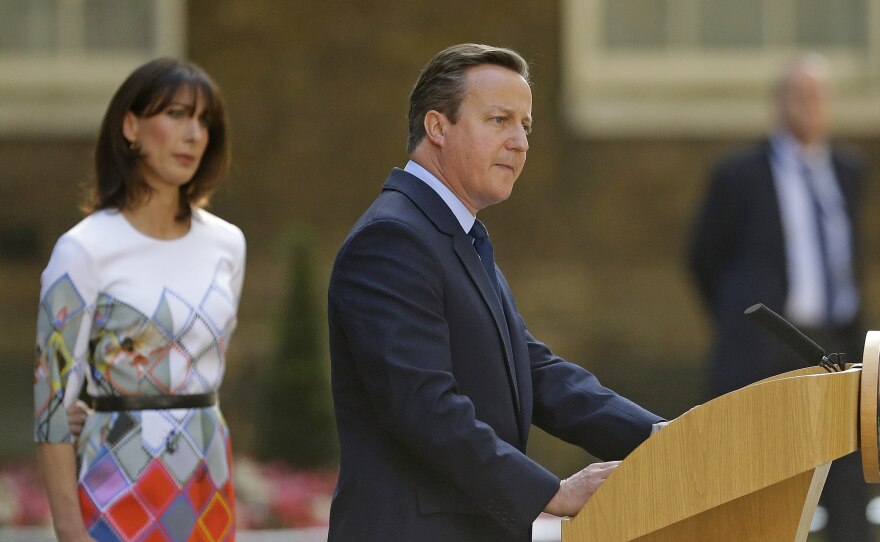
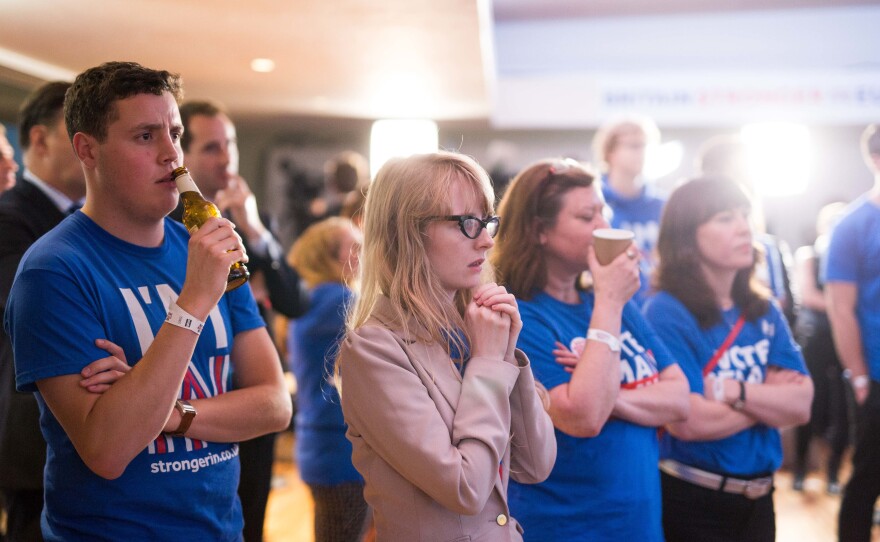
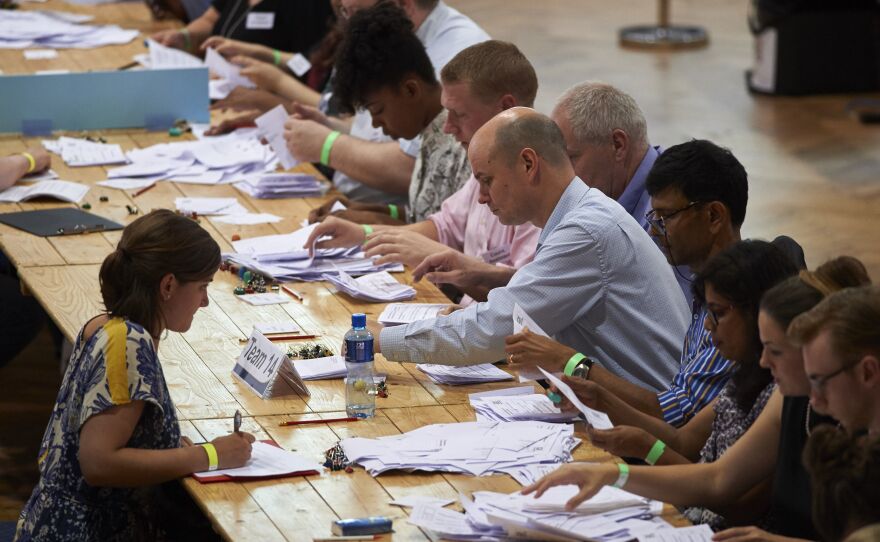
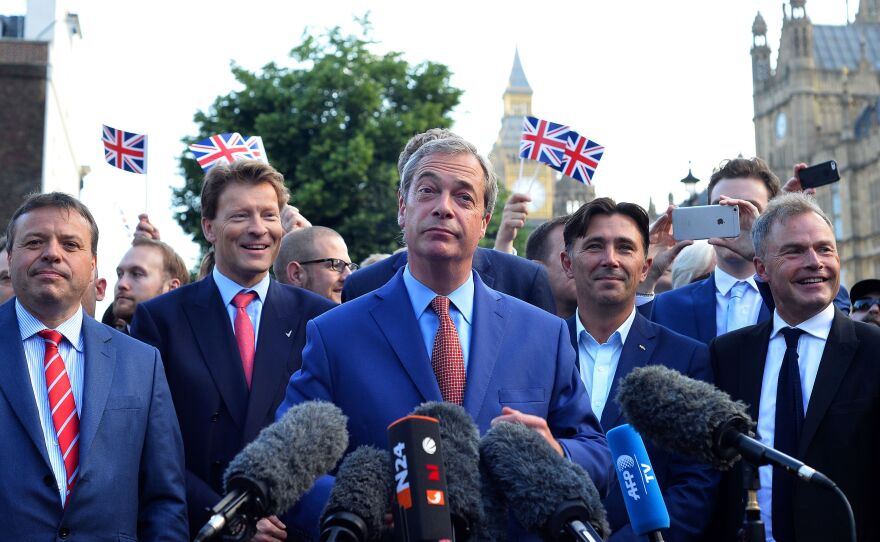
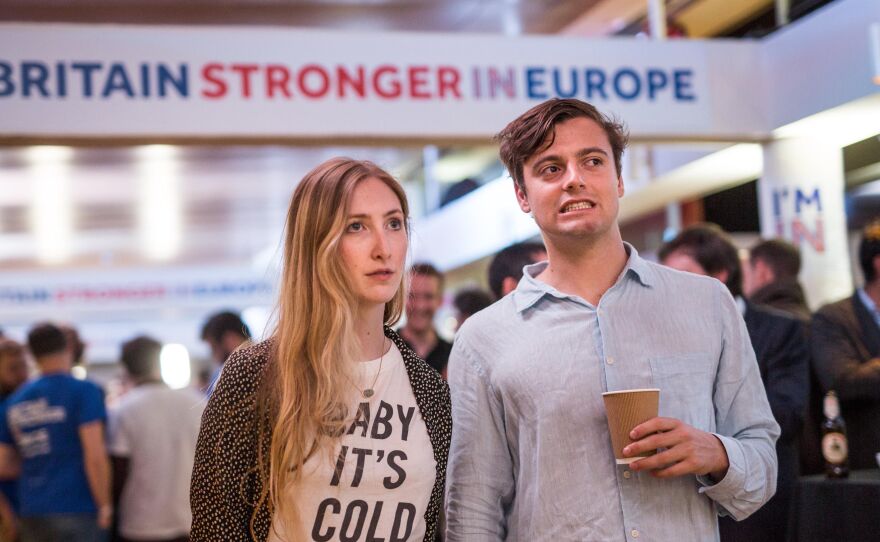
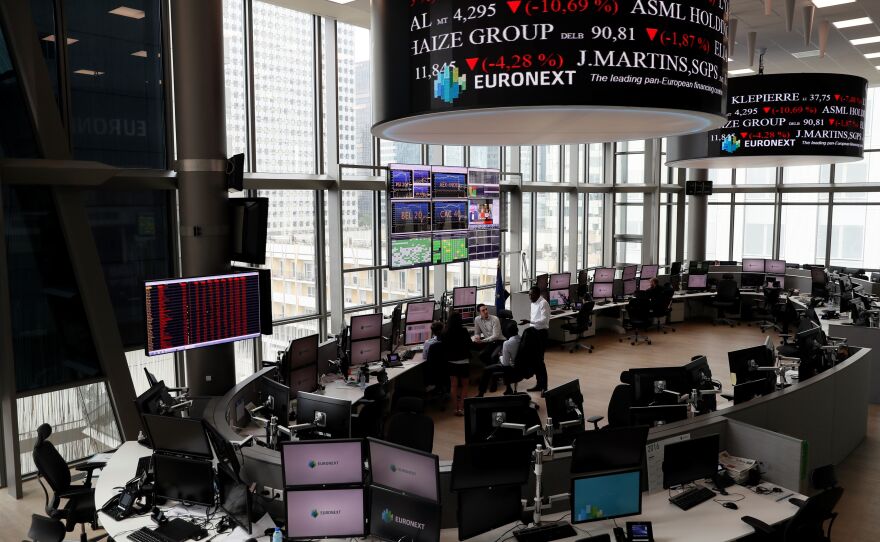
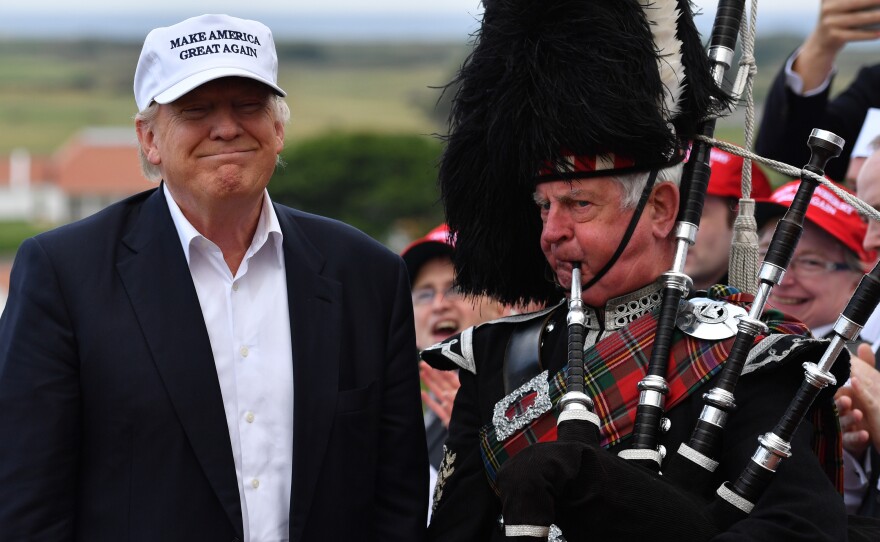
In U.K., Elation, Surprise And Uncertainty
Opinion polls showed a tight race, with the final poll — as well as the betting markets and the financial world — anticipating the U.K. would vote "Remain." That meant for many in the U.K. and around the world, the referendum's outcome came as a shock.
The results showed sharp regional divisions in the United Kingdom. London, Scotland and Northern Ireland had strong pro-EU results, while rural and economically depressed areas backed the so-called Brexit in large numbers.
NPR's Frank Langfitt says that in London today, people who wanted to remain in the EU are both disappointed and "very surprised."
"People who wanted out are elated," he said. "There's one woman I talked to who actually screamed."
Jeremy Corbyn, leader of the opposition Labour Party, said voters were reacting to decades of mistreatment by successive governments.
"Many communities are fed up with cuts, fed up with economic dislocation and feel very angry at the way they've been betrayed and marginalized," Corbyn said.
Anger over immigration was a potent force among the "Leave" camp, Frank says.
Many voters who opted out of the EU "felt that the price of immigration was just too high, that it was driving down wages, costing people jobs," he says. "With some white Britons, there was a feeling also that the immigration was changing the nature of communities here."
Many voters also distrusted the experts and powerful leaders urging voters against the Brexit, Frank says:
"The rest of the world, for what it's worth, was telling the Brits not to do this. Economists almost uniformly were against this; they said it would damage the British economy and the global economy. Political leaders from Xi Jinping in China to Barack Obama said this would make Britain less relevant. But the voters — to some degree, I think, tired of being told what to do by the elites — made up their minds."
As U.K. Breaks Off, Might It Break Apart?
Northern Ireland's strong Remain vote led Sinn Fein chairman Declan Kearney to call for a referendum on unification with Ireland, an EU member country. Sinn Fein is the largest Irish nationalist party in Northern Ireland.
Northern Ireland's deputy first minister, nationalist Martin McGuinness, said holding such a vote is "a democratic imperative."
Pro-British First Minister Arlene Foster, meanwhile, said there was "no way" such a vote would result in a united Ireland.
Scotland, too, may be eyeing a split with the U.K. — again. A 2014 referendum on Scottish independence resulted in the country remaining within the United Kingdom.
But now that the U.K. will be leaving the EU, a second referendum may be in the works. Scotland's voters preferred "Remain" over "Leave," by 62 percent to 38 percent.
Scottish First Minister Nicola Sturgeon says the result is Scotland being pulled out of Europe against its will.
"I regard that as being democratically unacceptable," she said Friday. "It's a statement of the obvious that a second referendum [on independence] is on the table."
In Europe, 'Complete Shock'
The United Kingdom is (or was, until the pound crashed) the second-largest economy in the EU, and the referendum comes as a blow to the continent.
"I think there was complete shock this morning when people woke up," says NPR's Soraya Sarhaddi Nelson, reporting from Berlin. "Like most Europeans, everybody here thought they would wake up to the U.K. still being in the EU.
"It's unusual here to have a quick reaction from officialdom, but there actually was some reaction," she says. "The vice chancellor I think summed it up for all when he tweeted, 'Damn, a bad day for Europe.' "
Current EU president Donald Tusk said the group is "determined to keep our unity at 27," referring to the number of member nations minus Great Britain. He went on to say, quoting his father, "What doesn't kill you makes you stronger."
The EU assembly will hold an emergency session next week in the wake of the news, The Associated Press reports. The referendum's results will also be the top item on the agenda for an upcoming summit of EU leaders in Brussels.
Germany's foreign minister, Frank-Walter Steinmeier, tweeted the vote was "a sad day for Europe and Britain." France's foreign minister, Jean-Marc Ayrault, said he was "sad for the United Kingdom."
Poland's foreign ministry, meanwhile, called it a "warning signal" of "disillusionment with European integration," the AP reports. Hungary's prime minister, Viktor Orban, said the vote pivoted on the question of immigration and signaled the importance of Brussels listening to the "voice of the people" in member states. Anti-immigration sentiment has been playing a central role in politics within both countries.
Euroskeptic parties in Sweden and Denmark called for EU membership referenda in their own nations, the AP writes, as did far-right leader Marine Le Pen in France.
As for what happens next: NPR's Peter Kenyon explains there is a two-year window for the U.K. and the EU to come to an agreement over the terms of its departure from Europe.
As Peter noted earlier, some members of the "Remain" camp have worried that a Brexit would give the EU an incentive to keep other member states from fleeing: "Therefore, the argument goes, they would offer the U.K. very poor exit terms — such as drastically limiting the U.K.'s access to the EU single market — as a warning to other states."
In U.S., Economic Effects And Political Echoes
While laws and policies in the U.K. aren't changing immediately, the impact of the Brexit on the rest of the world, including the U.S., has already begun.
The British pound is one of the world's stable "reserve" currencies, and it's fallen precipitously in value. Markets, too, have contracted. On Friday morning, the Dow opened and immediately dropped approximately 500 points.
"I think over the long term for the United States, it's going to mean a little bit slower economy," reports NPR's John Ydstie. "It means a stronger dollar, which is going to hurt exports. It also means that our trading partners, like the EU and the U.K., are going to go through a period of uncertainty and their growth could be hampered — so, again, exports to those countries could be hurt."
As NPR's Marilyn Geewax has previously reported, there's also the risk of a domino effect of exits — whether Scotland leaving the U.K. or more countries leaving the EU. Either would cause political instability, "as well as disruptions in flows of labor, capital and commerce," Marilyn writes, "harming U.S. business dealings."
"But some conservatives say Brexit would spur growth by freeing the U.K. from regulatory overreach by EU bureaucrats," Marilyn notes.
And, John says, "I guess the silver lining to this cloud is that if you're taking a trip to the U.K. this summer for a vacation, your dollar is going to go a little bit further."
Meanwhile, many observers are noting the similarities between the politics over the referendum and the U.S. presidential election.
Tony Travers, a professor at the London School of Economics, spoke with NPR's Frank Langfitt after the referendum results were announced.
"I think the lesson is, in part, a traditional one: a disconnect between political elites as they're called — people who run the government and the financial system and so on — and most other people," Travers said. "And, you know, in the United States the rise of Donald Trump and Bernie Sanders, I think, is evidence of a similar phenomenon."
Trump, the presumptive Republican nominee, is currently in the U.K. visiting the Trump Turnberry golf course.
Although he was in Scotland — which, again, overwhelmingly voted to remain in the EU — Trump tweeted that the "place is going wild over the vote. They took their country back, just like we will take America back."
Speaking at his golf course in Scotland, he said people are angry, which fueled the Brexit vote. He also said the weaker pound will help business at the golf course.
In a statement, Trump said Americans, too, will have an opportunity to "re-declare their independence" and "reject today's rule by the global elite," and said he hoped America is watching.
President Obama issued a statement Friday morning, saying "the people of the United Kingdom have spoken, and we respect their decision."
"The special relationship between the United States and the United Kingdom is enduring," he said. "So too is our relationship with the European Union."
Copyright 2016 NPR. To see more, visit http://www.npr.org/.







